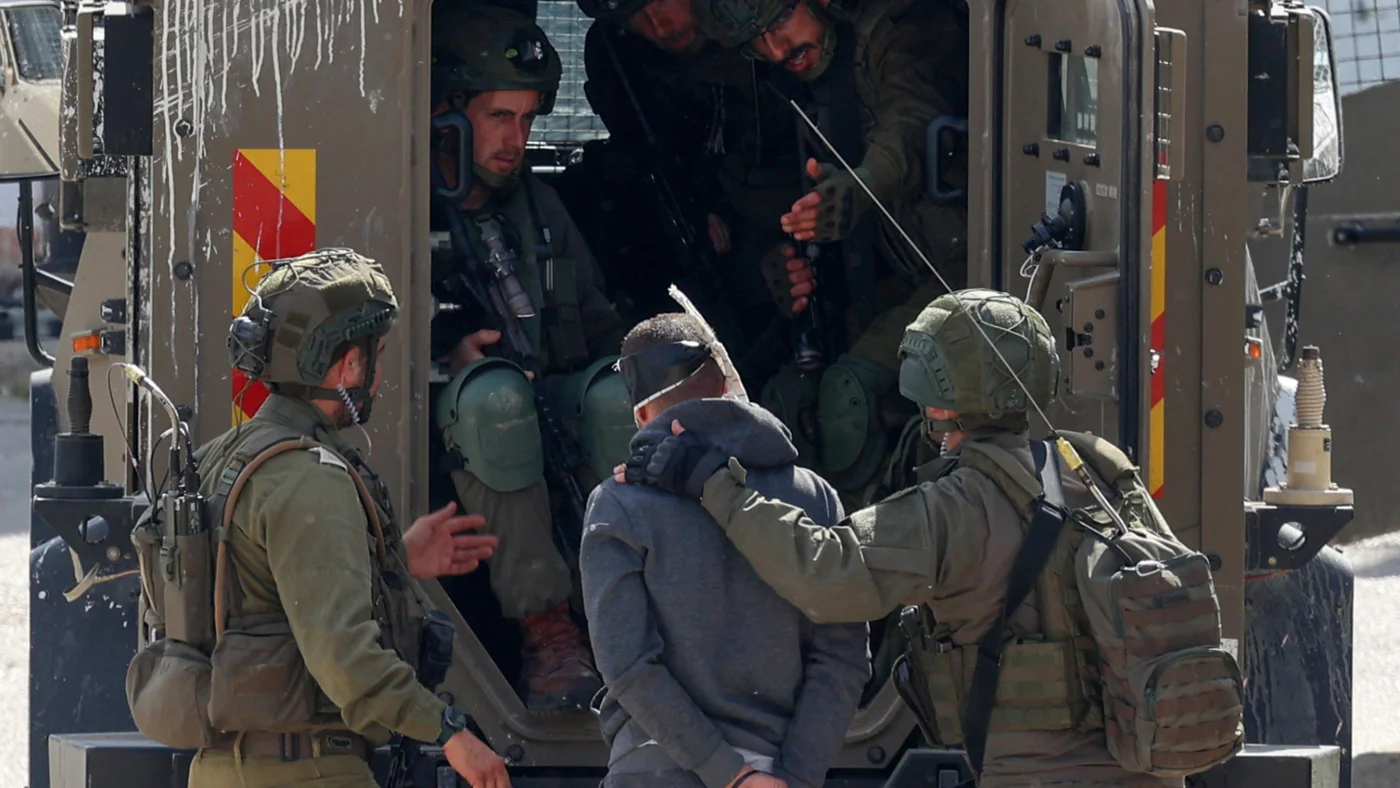
Human Rights Defenders say that Israel’s actions violate the terms of the February agreement and send a warning to other released prisoners
The Israeli army again arrested seven Palestinians on Thursday in the busy West Bank, all of which had been released as part of the latest prisoner exchange agreement with Hamas in February.
Six of the prisoners were arrested in Qalqilya, and the seventh was arrested in Ramallah.
They were taken to unveiled places, neither their whereabouts nor the circumstances of their detention were disclosed.
In recent months, Israeli soldiers have again arrested 13 Palestinians who had been released by the February agreement.
Seven continue in custody, including a woman, while six were placed in administrative detention – a controversial Israeli practice by which individuals are kept without accusation or judgment, with the possibility of indefinite renewal.
In Qalqilya, several Israeli military vehicles invaded the city at dawn, invading the houses of newly liberated Palestinian prisoners.
Among the prisoners again was Saed Al-Fayed, 51, who spent 23 years in Israeli arrests and was released as part of the recent prisoners’ exchange agreement.
His son, Issa Al-Fayed, told Middle East Eye that soldiers entered the house, called his father by name, handcuffed him and took him without any explanation to the arrest.
“It was a shock to us. We didn’t wait for him to be arrested anytime soon,” he said.
“We hope it will be a temporary detention, but we also fear that it be placed in administrative detention, as happened with several others released in the agreement.”
Infringement of the agreement
In January, Israel and Hamas arrived at a ceasefire agreement in Gaza that included a prisoners exchange. Hamas released 25 living Israelis and the bodies of eight others in Gaza, in exchange for the release of about 1,900 Palestinians by Israel.
According to the terms of the agreement – which Israel later reneged when he resumed the air strikes in Gaza – the released Palestinians would not be arrested again for the same accusations for which they had previously been arrested.
“There is no international law that prevents the Israeli occupation from arresting released prisoners again,” added Al-Fayed, who believes his father was taken to the Israeli military field of Tzofim.
In the city of Birzeit, north of Ramallah, Israeli forces invaded the house of Salama al-Qatawi, another Palestinian released under the agreement. He was in the hospital with his brother at the moment.
His other brother, Abdul Rahman al-Qatawi, told Mee that the soldiers searched the house, gathered the family in a room and demanded to call Salama to return home.
“After contact, he arrived by car. The soldiers removed him from the vehicle, handcuffed him and took him to a military vehicle. Then they searched the car thoroughly,” said Qatawi.
This is the fifth time soldiers invade the Al-Qatawi family home since Salama’s release in February. On all occasions, he was threatened with a new prison and placed under surveillance.
Salama planned to get married and resume work in the engineering area she had studied. His family was shocked by the speed with which he was arrested again.
“There should be international guarantees, but under occupation, there are none. We fear it is placed in administrative detention,” added Qatawi.
‘A message to the liberated prisoners’
According to Amani Sarahneh, spokesman for the Palestinian Prison Club, the latest arrests are part of Israel’s growing campaign to reach prisoners released under the recent exchange agreement.
Sarahneh told Mee that this is part of a systematic policy and represents a clear violation of the agreement.
“This is a new message for all liberated prisoners: they will remain under threat and persecution,” she said.
Sarahneh added that such arrests are part of longtime Israeli practices against former prisons, but became particularly pronounced in the case of those prisoners again after the 2011 Shalit agreement.
In 2014, Israel arrested 40 Palestinians who had been released in the 2011 exchange agreement by Israeli soldier Gilad Shalit, who was made prisoner by Hamas.
Many of them had their long -term sentences restored, which was seen as a violation of the agreement.
“Israel institutionalized the persecution of prisoners released by various means, including military orders, laws and proposals for legislation that expanded the legal structure for their new judgment.”
She also noted that the most recent prisoners’ exchange saw a sharp climb of these tactics.
“In the last agreement, the persecution reached the level of organized terrorist operations against prisoners until the moment of its release. Many were subjected to severe beating before that,” she said.
“The pressure continued after liberation, not only about them, but also about their families, which face constant threats to date.”
There are currently more than 10,000 Palestinian political prisoners detained in Israeli arrests, including 3,577 under administrative detention, 400 children and 35 women, according to Addameer, a Palestinian Human Rights Organization that monitors prisoners.
This number does not include the thousands of Palestinians kidnapped in the Gaza Strip during the Invasion Invasion of Israel.
Originally published by Mee on 05/22/2025
Par Fayah and Ramallah, Palestina oventi
Source: https://www.ocafezinho.com/2025/05/22/israel-prende-novamente-palestinos-libertados-no-ultimo-acordo-de-troca-com-o-hamas/

